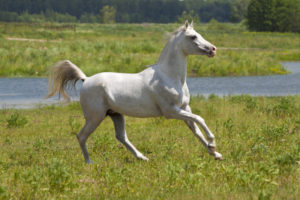A Reminiscence
 Whenever we went for a drive on Sunday afternoons and on long trips, too, back in the 50’s, Dad stamped white horses. If he spotted a white horse in a field by the side of the road, he’d lift his right hand from the steering wheel, lick the end of his index finger, punch it against the palm of his left hand still on the wheel, and slam his right fist against his palm to seal the deal.
Whenever we went for a drive on Sunday afternoons and on long trips, too, back in the 50’s, Dad stamped white horses. If he spotted a white horse in a field by the side of the road, he’d lift his right hand from the steering wheel, lick the end of his index finger, punch it against the palm of his left hand still on the wheel, and slam his right fist against his palm to seal the deal.
On our rides, Dad and I competed to see who stamped the most white horses. So he liked to wait until we’d almost passed the horse and it was almost out of sight to stamp it, so I’d miss it and he’d win. He’d chuckle like crazy as I’d turn my head to look for the white horse and say, “Where is it? Where is it? I missed it. Oh darn it, Daddy.”
(Two can play that game.)
I don’t imagine we stamped too many white horses on a drive in Clarion County PA that we took close to the Fourth of July in 1955.
My dad’s mother, Grandmother Willman, wearing a faded, short-sleeved house dress, but as stiff-necked as usual, came with us. She wanted to find the house her husband grew up in. Though the area hadn’t changed as much as it would in the next decade with the building of the interstates and the subsequent development along them, it had been a very long time, sixty years or more, since she visited that house. You forget lots in sixty years, something I understand much more now than I did when I was fourteen going on fifteen, a supple young thing who didn’t understand how age stiffens necks.
Our usual seating arrangement in the car was Dad at the wheel. Mom rode shotgun. Our dog, a short-legged beagle mix with a big brown spot in the middle of her white back, sat in Mom’s lap. I rode in the back.
On that particular ride, Grandmother Willman sat in front, so she could give Dad directions. Mom, Dotty, and I rode in back.
Mom was obviously pissed off about the seating arrangements. She glared through her glasses with her snapping black eyes at the back of her mother-in-law’s head, covered with silky white hair pinned in two braided crescents that crisscrossed each other just above her seamed neck.
Mom always said Grandmother Willman was a bitch because before Dad married Mom, Dad sent most of the money he made working for the CCC home to his mother to save for him.
Or so he thought until his wedding to Mom on 7/11/37, he asked his mother for his money, and Grandmother Willman said, “Money? What money? I don’t have any of your money.” Whenever Mom told this story, she bellowed those exact same words in the exact same way. And so my dad had to take out a loan of $200, a substantial sum back then during the Depression, to start his married life with my mom.
I’m certain Grandmother Willman disapproved of my mom just as much. They were so different, the one a stern, church-going, teetotal countrywoman and the other a city girl with a New Jersey accent who didn’t attend church much, not even on Easter and Christmas, except for the social stuff like the annual picnic. Also Mom used words like “bitch” and “shit” and didn’t mind the occasional beer or cocktail.
Grandmother Willman’s disapproval of the girl Dad married the second time around passed down to me. Though my mom was a world-class housekeeper and kept a far tidier house than any of my dad’s sisters and his mom, she wasn’t teaching me crucial womanly kitchen skills. (She didn’t want me underfoot when she was in the kitchen fixing supper.) Also my mom earned her living as a nurse before she and Dad got married.
I was headed down the same wrong path of wanting to go to college and to earn my living instead of getting married, making babies, and keeping house.
But that day, given a choice between staying back at the family farm with Dad’s relatives that she barely knew and going somewhere, anywhere, in the car, Mom shut her mouth and glowered at her mother-in-law from the back seat. She was probably just waiting for Grandmother Willman to say something or do something Mom could bitch to my dad about for days, weeks, months, and years to come. (“And that’s another thing that burns my ass off about your mother, Homer,” she’d say.
The drive, maybe punctuated by Dad and me stamping a white horse or two, took a while because Grandmother Willman was unsure of the directions. It must have been a point of pride that in the end she did remember where the house was and finally the car bumped along a lane past a new farmhouse, white with bright blue shutters, till we came to an old house inside a square of dirt with a rickety barbed wire fence around it. Even I who’d never seen the house before was shocked by its condition.
“This must be it, Mother,” Dad said as he pulled the car close to the fence. He turned off the engine, opened his door and got out without closing the door on that side. He stared across the top of the car.
Mom squeezed against me as she looked out the window on my side of the car. “Is that really it?” she said. “I can’t say much for it.”
Staring at the old house, I tried to figure out what was wrong with it. Well, for one thing, it was the gray of weathered wood without any paint at all. There wasn’t anything green around it. Unlike my father’s mother’s family farmhouse, it didn’t have a pond sitting in front of it. And then I realized what I didn’t see, too. It sat alone inside that fence without a single outbuilding, spring house, outhouse or corn crib, shed or barn.
After a while, Grandmother Willman said, “I believe the people that own the place now are using the old house as a barn.”
“I think you’re right, Mother,” Dad said, his voice a little distant from outside the car. He turned and poked his head back in. “I tell you what. Why don’t we look around? The cows aren’t in the barnyard and I’m sure the new owners won’t mind.”
“Yes, let’s,” Mom said. “I hate to think we came all this way for nothing.”
Mom opened the door. The floppy-eared Dottie spilled out. My mom slammed the door and I jumped out my side. Grandmother Willman was the last out, helped by my dad though I don’t think she stopped looking at that falling-down house the whole time.
Dad went ahead and unlatched the wide gate, shut by a loop of wire, held the gate open while we trooped through, then closed it. A little closer, I saw that the windows didn’t have a bit of glass anymore though a rag of a curtain blew through a window on the second floor.
Glad to be out of the car, I ran ahead of the others, up the narrow stone steps and through the doorway (no door left) straight into the house. Momentum carried me through what must have been the kitchen and parlor, up narrow steps to a hall and into a bedroom. Finally, the sight of faded wallpaper shredded down the walls, straw littering the floor, mouse droppings, and the stink of must and decay stopped me. This is horrible, I thought. Finding the house in this condition was worse than not finding it at all. It was like walking inside a corpse.
I heard my mom and dad marching around downstairs, as they tried to figure out the layout of the house, but I couldn’t stand breathing the close, rotten air of that house anymore. By the time I got back outside, Grandmother Willman was there, too, gazing at the house through wire-rimmed glasses that reflected the sunlight so I couldn’t see her eyes.
I heard her voice shake, though, as she pointed toward a nearly leafless, thorny plant growing by the steps. “That’s a blackberry bush,” she said. “My mother-in-law made the best pies with the berries from that bush.”
Suddenly, I felt sorry for Grandmother Willman, in her faded house dress, stiffly corseted underneath, in her black granny shoes and stockings, as she remembered all the people she’d known and loved who’d lived in that now dead house, alone and solitary in a barren field.
